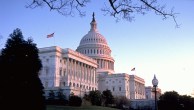“There’s a proverb that says one generation plants a tree and another gets the shade,” said Jim Towey, director of the White House Office of Faith-Based and Community Initiatives, reflecting on the office’s first year at an event sponsored by the Pew Forum on Religion and Public Life Wednesday afternoon.
CONTACT
Mary Schultz
Communications Manager
202.419.4556
mschultz@pewresearch.org/pewresearch-org/religion
“A lot of the work that was done in the faith-based office this first year was the work of plowing the field and sowing the seeds and laboring in very difficult circumstances.”
Towey, named deputy assistant to the president and director of the Office of Faith-Based and Community Initiatives on February 1, joined scholars Kathryn Dunn Tenpas, Paul Light, and Gregg Ivers in a panel discussion on the White House Office on Wednesday, February 20, 2002–the one-year anniversary of the office’s opening.
At the event, the Pew Forum released a 16-page report, Can an Office Change a Country?: The White House Office of Faith-Based and Community Initiatives, a Year in Review. Written by Tenpas, a professor at the University of Pennsylvania and a guest scholar at the Brookings Institution, the report examines the campaign creation and transition planning of the office, identifies the challenges the office faced in its first year, and assesses its future prospects and plans.
In its first year, according to the report, the office suffered from “classic organizational problems: shifting priorities, lack of autonomy for the director, the absence of internal White House coordination and inflated expectations.”
During his campaign Bush pledged to create an office devoted to his faith-based initiatives, originally slated to be named the Office of Faith-Based Action.
But the haste with which the office opened (two weeks into the Bush administration), the uncertainty surrounding the appointment of the director, an initial staffing shortage and budget problems–not to mention the name change because the “Office of Faith-Based Action” sounded too religious–foreshadowed a turbulent year for the White House Office.
While former director John DiIulio advocated a “consensus-building, ‘go-slow’ approach, House Republicans had already drafted a far-reaching bill and wanted to run with it….Soon they would realize that they underestimated the serious opposition to HR 7–some of which would come from within their own party,” the report notes.
But despite these setbacks, the office achieved notable successes in its first year, including the passage of HR 7, the heightened public attention to faith-based initiatives, and, in an “under-the-radar coup,”
the creation of five Cabinet-based centers that promote implementation of faith-based legislation and will allow “the rewriting of hundreds of regulations” that could shift the flow of federal funds to religious groups.
“It’s worth speculating about what might have happened had the Bush team not pursued the bold, momentous approach of signing two executive orders and showcasing the faith-based initiative during the second week of the administration,” Tenpas said. “In retrospect, the ‘go-slow,’ moderate, consensus-building approach certainly had its merits.”
While Towey didn’t respond directly to Tenpas’s critique of the White House Office, he did say that some of the obstacles the office has faced in the past year were “inevitable.” Establishing the office was a “very dynamic process. The president was blazing a new trail.”
[that]
[few]
When the debate “is centered on the needs of the poor and on the urgency attending those needs, then we find that a lot of the political quagmire and the partisan politics…can give way to this urgency which unites Americans, and which is the reason the president established the office in the first place.
“Our office is not big. It does not have a lot of staff, it does not have a lot of budget. What it does have, though, is an urgent task and an important task which, on its own, will, I believe, drive it to success in the coming years. It also has a special place in the president’s heart.”
Despite Towey’s optimism, the other panelists raised further concerns about the work of the office.
Paul Light, vice president and director of the governmental studies program at the Brookings Institution, pointed out that a key question the office must address this year is how voluntary organizations–both faith-based and non-faith-based–can be strengthened as destinations for government funding.
“We have ample evidence that there is not good organizational capacity out there on either side of the voluntary sector, and I think the Office of Faith-Based Initiatives has to get involved in the basic issues of strengthening organizational capacity,” he said.
[non-faith-based]
Additionally, Light said, the office must address issues such as how volunteer organizations can be protected from the threats associated with receiving federal funding, how smaller organizations can be given the chance to participate, and how the government can be protected against faith-based organizations.
Gregg Ivers, professor and chair of the Department of Government at American University, took one step back from the afternoon’s debate to suggest questioning the assumption that the creation of the White House Office “is a good thing.”
“If we were having this same panel 30 years ago, would we even be talking about whether or not there would be a constitutional foundation for a direct public policy initiative on the part of the executive branch to aid religious organizations as well as non-religious organizations?”
“Would we be talking about a program that is designed to reach out and bring religious organizations into the fold of policy making as an exercise in neutrality, as an exercise in equality, or…as an exercise in government-sponsored favoritism?”
But Towey held his ground. “The initiative’s focus is not about funding religion or religious practice–that isn’t anything the president wants, nor is it constitutional,” he said. “The president’s initiative is about focusing on how can we compassionately respond to the needs of the poor.”
The discussion was held at the Carnegie Endowment for International Peace and was moderated by E.J. Dionne, Jr., senior fellow in the governmental studies program at the Brookings Institution, Washington Post columnist, and co-chair of the Pew Forum.
The Pew Forum on Religion and Public Life, based in Washington, D.C., seeks to promote a deeper understanding of the influence of religion on the ideas and institutions of American Society. To view the report, Can an Office Change a Country?: The White House Office of Faith-Based and Community Initiatives, a Year in Review, visit pewresearch.org/pewresearch-org/religion/events/022002/tenpas.pdf.




